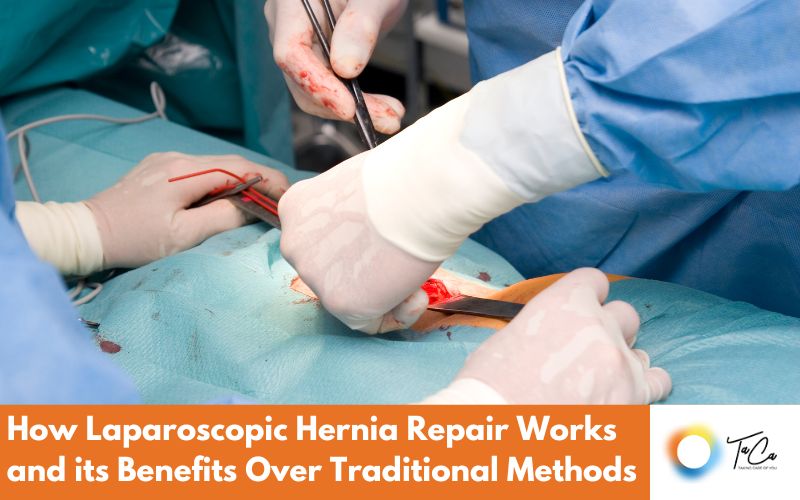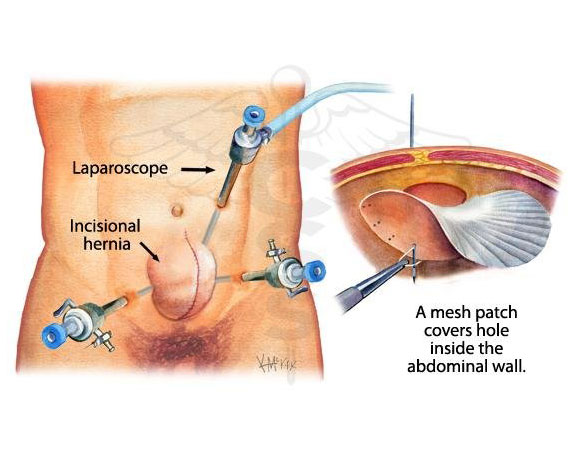Hernias are a common health issue that affects millions of people worldwide. It occurs when an organ or tissue pushes through a weakened spot in the muscle or connective tissue. The most common type of hernia is an inguinal hernia, which occurs in the groin area. Hernias can cause pain, discomfort, and in some cases, complications like strangulation, which requires immediate medical attention.
Conventionally, hernias have been fixed through open surgery, which involves making a large cut in the abdomen or groin to get to the hernia and fix it. But laparoscopic hernia repair has become a popular alternative to traditional surgery in recent years because it has many benefits.
Laparoscopic hernia repair Surgery Procedure
Laparoscopic hernia repair is a minimally invasive surgery that fixes the hernia with the help of a small camera and special surgical tools. During the procedure, the surgeon makes a few small incisions in the abdomen and inserts a laparoscope, which is a thin tube with a camera and light attached to it. The camera shows pictures of what’s going on inside the abdomen on a monitor, so the surgeon can see the hernia and the tissue around it.
The Laparoscopic hernia surgeon then uses special tools to fix the hernia. This may include putting mesh over the weak muscle or tissue to make it stronger. The procedure is typically performed under general anesthesia and can take anywhere from 30 minutes to a few hours, depending on the size and location of the hernia.
Benefits of Laparoscopic hernia surgery
- One of the main benefits of laparoscopic hernia repair is that it is minimally invasive, which means that it causes less pain, scarring, and complications compared to traditional open surgery. Patients who undergo laparoscopic hernia repair often experience a faster recovery time and can return to normal activities sooner than those who undergo traditional surgery.
- A lower risk of infection and other complications compared to traditional surgery. This is because the procedure is performed using small incisions, which means that there is less exposure of the surgical site to bacteria and other pathogens.
- It associated with less postoperative pain, which means that patients may require fewer pain medications and can recover more quickly. This is particularly important for older patients and those with other underlying health conditions, who may be more susceptible to complications from surgery and pain medication.
Overall, laparoscopic hernia surgery is a safe and effective alternative to traditional open surgery for the treatment of hernias. It offers many benefits, including less pain, scarring, and complications, as well as a faster recovery time. If you have been diagnosed with a hernia, talk to your doctor about whether laparoscopic hernia repair may be a suitable treatment option for you.
It’s important to note that while laparoscopic hernia repair has many benefits over traditional surgery, it may not be suitable for everyone. For your hernia doctor to decide if laparoscopic hernia repair is safe and effective for you, he or she will need to look at your condition and medical history. You should consult a laparsocopic hernia specialist near you
In addition, while laparoscopic hernia repair is associated with a faster recovery time and less pain compared to traditional surgery, it is still a surgical procedure that requires careful postoperative care and monitoring. It’s important to follow your doctor’s instructions for postoperative care, including rest, pain management, and wound care, to ensure a smooth recovery.
Finally, like all surgical procedures, laparoscopic hernia repair does carry some risks, including bleeding, infection, and complications related to anesthesia. Your doctor will discuss these risks with you before the procedure and take steps to minimize them. It’s important to discuss any concerns or questions you have with your doctor before undergoing the procedure.







